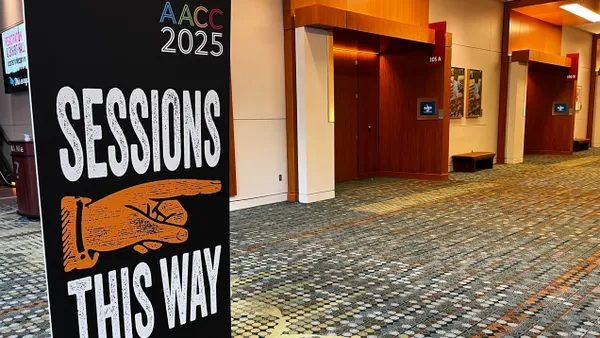Dive Brief:
- Enrollment of Asian American and Native Hawaiian and Pacific Islander students in California's community colleges dropped 20% from fall 2019 to fall 2021, in the wake of the COVID-19 pandemic. This is according to a May report from The Campaign for College Opportunity, a California nonprofit working to make college access more equitable.
- The report stressed that looking at average academic outcomes for Asian American and NHPI students as one group hides important variations. For example, 38% of Asian American community college students enrolled in 2013-14 transferred to a four-year university within six years. Among NHPI students, only 22% transferred. Some 15% and 11% of those cohorts, respectively, earned a degree or certificate.
- Colleges and universities should offer support systems to Asian Americans and NHPI students who have been impacted by an increase in hate crimes toward their community, according to the report.
Dive Insight:
The limitations of the term "Asian American" are often discussed, given that it can refer to some 50 ethnic groups.
The report’s researchers tried to break down the data to demonstrate the different outcomes and challenges faced by Californians of Asian and Pacific Island descent, according to Vikash Reddy, senior director of policy research at The Campaign for College Opportunity.
"In popular culture, and oftentimes in research that uses aggregate statistics, we think about these communities as a monolithic block, one that is universally high achieving or highly educated," Reddy said. "The breadth and the scope of the educational trajectories and experiences for California students are masked when you use coarser averages."
Educational policies and guidance that don’t account for the diversity within the Asian American and NHPI communities will not fully address the groups' needs, according to the report.
Over 15% of California's residents are Asian American or Native Hawaiian and Pacific Islander. Academic disparities appear when breaking down data between those two groups.
Among Asian American Californians, 59% of those aged 25 to 64 have a bachelor’s degree. But only 22% of NHPI Californians can say the same, giving that group one of the lowest bachelor's degree rates among all racial/ethnic groups in the state.
The drop in Asian American and NHPI student enrollment at community colleges is concerning because the state's two-year institutions are where 59% of both groups enroll. Enrollment at California's four-year institutions remained largely unchanged, something worth noting and celebrating, Reddy said.
The report recommends community colleges and universities offer support systems to Asian Americans and NHPI students who’ve been impacted by an increase in hate crimes toward their community.
This group experienced an uptick in racist sentiment and attacks during the COVID-19 pandemic, as some politicians and media personalities blamed China for the disease's evolution and nicknamed it "the China virus.”
The vitriol simultaneously targeted all people within the community and blamed an incredibly diverse group for a virus first detected in China. Anti-Asian hate crimes, including those committed on college and university campuses, increased roughly fivefold from 2019 to 2021, according to the report.
On the faculty side, the report found disproportionately low numbers of Asian American and NHPI teachers at California’s public colleges when compared to the student body.
The state's community colleges employed one Asian faculty member for every 45 Asian students and one NHPI faculty member for every 35 NHPI students. Meanwhile, for White students, the ratio was 1:14.
The report recommends California colleges commit to hiring and retaining Asian and NHPI faculty. It also advises the state's leaders to shift to an aid model based on student need, which would give 18,000 more Asian and NHPI students access to Cal Grant awards.













